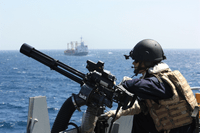Pirates operating off the coast of Somalia have resumed a disturbingly high rate of activity recently, despite hopes that the arrival of more foreign warships in the Gulf of Aden had discouraged the regional threat. Following a lull in late 2008, Somali pirates carried out almost 100 attacks during the first three months of 2009. The growing number and expanded range of these incidents has threatened important trade and transit routes connecting Africa, Asia, and Europe to Persian Gulf oil as well as other valuable commodities. Although the number of deaths directly attributable to the pirates has remained small, their activities have disrupted humanitarian relief operations within Somalia. In addition, the economic costs from piracy -- including delayed deliveries, damaged ships, higher insurance rates, and the detention of crews and passengers for ransom - have risen dramatically. In order to counter the growing threat to these vital sea lanes, the U.N., NATO, EU and various national governments have organized several separate multilateral and single-country maritime security operations in the Horn of Africa region -- which includes the Gulf of Aden, the west Indian Ocean, and the territorial waters of Somalia. Yet, solving the Somali piracy problem involves harmonizing these initiatives better, as well as pursuing short-, medium- and long-term strategies that combine regional and extra-regional cooperation, both at sea and on land.
Global Insights: Harmonizing the International Response to Somali Piracy

